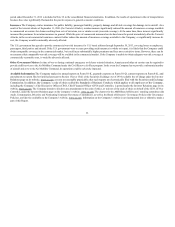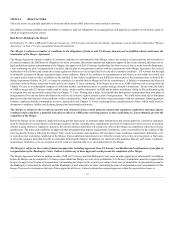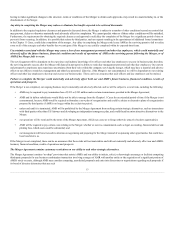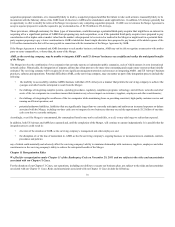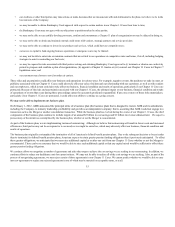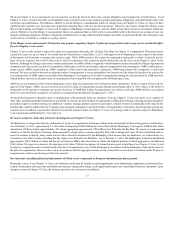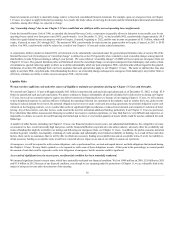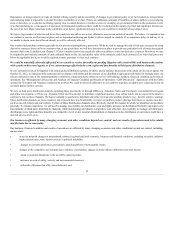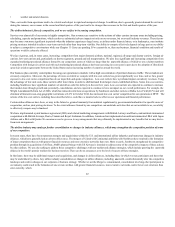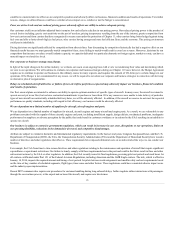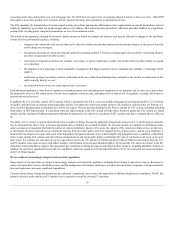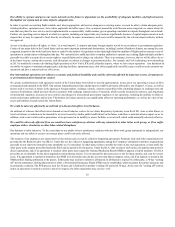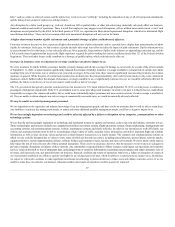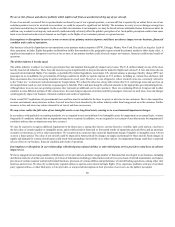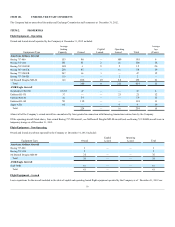American Airlines 2012 Annual Report Download - page 21
Download and view the complete annual report
Please find page 21 of the 2012 American Airlines annual report below. You can navigate through the pages in the report by either clicking on the pages listed below, or by using the keyword search tool below to find specific information within the annual report.
Dependence on foreign imports of crude oil, limited refining capacity and the possibility of changes in government policy on jet fuel production, transportation
and marketing make it impossible to predict the future availability of jet fuel. If there are additional outbreaks of hostilities or other conflicts in oil producing
areas or elsewhere, or a reduction in refining capacity (due to natural disasters or weather events, for example), or governmental limits on the production or sale
of jet fuel (including as a consequence of increased environmental regulation), there could be a reduction in the supply of jet fuel and significant increases in
the cost of jet fuel. Major reductions in the availability of jet fuel or significant increases in its cost would have a material adverse impact on us.
We have a large number of older aircraft in our fleet, and these aircraft are not as fuel efficient as more recent models of aircraft. We believe it is imperative that
we continue to execute our fleet renewal plans, and are dependent on Boeing and Airbus to deliver aircraft on schedule. If we experience delays in delivery of, or
are unable to obtain, more fuel efficient aircraft, we will be adversely affected.
Our aviation fuel purchase contracts generally do not provide meaningful price protection. While we seek to manage the risk of fuel price increases by using
derivative contracts, there can be no assurance that, at any given time, we will have derivatives in place to provide any particular level of protection against
increased fuel costs. In addition, our Chapter 11 Cases or market factors may negatively affect our ability to enter into derivative contracts. Moreover, we may
be required to post material amounts of cash collateral based on the size and market value of the contracts, and if such contracts close when fuel prices are
below the applicable levels, we would be required to make payments to close such contracts.
We could be materially adversely affected if we are unable to resolve favorably our pending litigation with certain GDSs and business discussions
with certain on-line travel agents, or if we cannot manage effectively the costs, rights and functionality of third party distribution channels.
We are currently involved in litigation with certain global distribution systems, or GDSs, and in business discussions with certain on-line travel agents. On
October 31, 2012, we announced the settlement of our disputes with Sabre and the renewal of our distribution agreement with Sabre for multiple years. An
adverse outcome in any of the remaining matters could have a material adverse effect on our level of bookings, business, financial condition and results of
operations. See “Management's Discussion and Analysis of Financial Condition and Results of Operations - GDS Discussion.” Agreements with the GDSs
operated by Travelport and Amadeus continue to be in effect. We could be adversely affected if we are unable to negotiate acceptable new contractual terms for
our participation in these systems.
We rely on third party distribution channels, including those provided by or through GDSs (e.g., Amadeus, Sabre and Travelport), conventional travel agents
and online travel agents, or OTAs (e.g., Expedia, Orbitz and Travelocity), to distribute a significant portion of our airline tickets and we expect in the future to
continue to rely on these channels. We hope eventually to use them to distribute and collect revenues for ancillary products (e.g., fees for selective seating).
These distribution channels are more expensive and at present have less functionality in respect of ancillary product offerings than those we operate ourselves,
such as our call centers and our website. Certain of these distribution channels also effectively restrict the manner in which we distribute our products
generally. To remain competitive, we will need to manage successfully our distribution costs and rights, increase our distribution flexibility and improve the
functionality of third party distribution channels, while maintaining an industry-competitive cost structure. Any inability to manage our third party
distribution costs, rights and functionality at a competitive level or any material diminishment or disruption in the distribution of our tickets could have a
material adverse effect on us.
Our business is affected by many changing economic and other conditions beyond our control, and our results of operations tend to be volatile
and fluctuate due to seasonality.
Our business, financial condition and results of operations are affected by many changing economic and other conditions beyond our control, including,
among others:
•actual or potential changes in international, national, regional and local economic, business and financial conditions, including recession, inflation,
higher interest rates, wars, terrorist attacks or political instability;
•changes in consumer preferences, perceptions, spending patterns or demographic trends;
•changes in the competitive environment due to industry consolidation, changes in airline alliance affiliations and other factors;
•actual or potential disruptions to the air traffic control systems;
•increases in costs of safety, security and environmental measures;
•outbreaks of diseases that affect travel behavior; and
21


